|
As a European born some years after the event, I can perhaps be forgiven for not being aware of the work of the Tennessee Valley Authority – or TVA as it was more widely known – until I sat down to watch the socially conscious romantic drama Wild River. I'm not about to start creatively rewriting the documents that I've since read on the TVA's history and work, but will quote directly from the Wikipedia page that concisely outlines its function:
The Tennessee Valley Authority (TVA) is a federally owned corporation in the United States created by congressional charter in May 1933 to provide navigation, flood control, electricity generation, fertilizer manufacturing, and economic development in the Tennessee Valley, a region particularly affected by the Great Depression. The enterprise was a result of the efforts of Senator George W. Norris of Nebraska. TVA was envisioned not only as a provider, but also as a regional economic development agency that would use federal experts and electricity to rapidly modernize the region's economy and society.*
The more I read about its work in the 30s and 40s, the more I found that we could still learn from. The TVA Act itself was signed by newly elected President Franklyn D. Roosevelt, who during his campaign had claimed that private utility companies had selfish movies, reflecting a widely held view that these corporations were overcharging for their services and were abusing their power. Sound at all familiar? The TVA thus brought these companies into public ownership, a move that was vigorously opposed in some quarters, not because it was a bad idea in itself, but because it was deemed to be 'socialist'. And we can't have that, can we? But have it they did, and to this day the TVA remains the largest publicly owned provider of power in America.

One of its key aims was to bring affordable electricity to people who had been most heavily impacted by the Great Depression, and few places had been as badly hit as the Tennessee Valley. Despite my assurance above, I might as well let the TVA itself outline how it responded:
Much of the land had been farmed too hard for too long, eroding and depleting the soil. Crop yields had fallen along with farm incomes. The best timber had been cut. TVA built dams to harness the region's rivers. The dams controlled floods, improved navigation and generated electricity. TVA developed fertilizers, taught farmers how to improve crop yields and helped replant forests, control forest fires, and improve habitat for wildlife and fish. The most dramatic change in Valley life came from the electricity generated by TVA dams. Electric lights and modern appliances made life easier and farms more productive. Electricity also drew industries into the region, providing desperately needed jobs.**
Too socialist? Up yours. For me, this is exactly the sort of thing that government owned agencies and industries will always do better than their privately run equivalent. It's all in the motivation. For the federally owned TVA, the primary purpose was to help the people it served, and ultimately teach them how to help support themselves, which in turn would fuel regeneration in the areas in question (which it did). For privately owned utility companies, the primary reason for their existence even today is the generation not of power, but of large wads of cash. Everything else is secondary, including the welfare of their customers and society at large, despite what their cynically smarmy ads and PR people try to con you into thinking is actually the case.
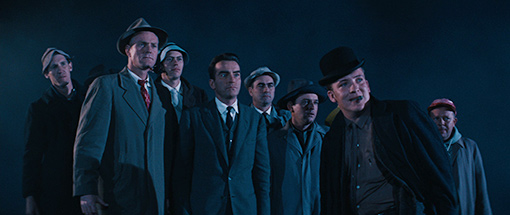
One of the major projects undertaken by the TVA was the construction of a number of hydroelectric dams to provide that promised power, a process that involved relocating those who lived in areas that would be flooded as a result. It's this process of migrating people, some of whom will not be happy about being moved to new homes for the greater good, that sits at the core of Wild River, a 1960 feature from Elia Kazan, a man whose talent as a filmmaker is beyond question, but whose success was made possible in part by the names that he provided to the monstrous and pompously self-titled House Committee on Un-American Activities. It's an aspect of Kazan's career that remains controversial to this day, but which has already been succinctly covered by my fellow reviewer Camus in his review of Kazan's Boomerang, also available on Masters of Cinema Blu-ray. As Camus rightly states, we who might criticise from the present weren't there at the time, but as someone who has stood by his principles on a number of occasions when logic dictated I should cave in and go with the flow, sometimes at cost to my career (such as it is), my sympathies are and always have been firmly with those who refused to testify and those who were blacklisted as a consequence. Think about the Jules Dassin films that didn't get made because he stood by his own principles and refused to shop his friends and colleagues, and as far as I'm concerned, Dassin was every bit as great a filmmaker as Kazan. Believing that something is very wrong is not the same as making a stand against it, and I still like to think that if everyone in Hollywood had stood shoulder to shoulder with those whose careers the HUAC set out to destroy, then they could have brought the Committee to its knees. Collectively, the Hollywood hierarchy had considerable power back then, and if American moviemaking had been brought to a halt and the public been made truthfully aware of why (a tall order, I know), then how long would the HUAC mob have been able to continue their work unmolested? Solidarity is the key, brothers and sisters. Too socialist? Up yours.
But here's the thing. Kazan was an ex-communist party member himself and retained a liberal viewpoint for a good part of his career, one reflected in the social issues explored by a number of his most celebrated films. He thus initially approached Wild River – ostensibly the story of a determined young TVA man who is charged with convincing an ageing and stubborn matriarch to leave her island home before the flood waters engulf it – with the intention of paying tribute to the TVA and its work. But as he became more involved with the project, he found his sympathies shifting from young TVA representative Chuck Glover to Ella Garth, the woman he has been charged with persuading to leave. It's a conflict of viewpoints reflected in the film itself, and one of the things that makes Wild River such an intriguing and unusual drama.
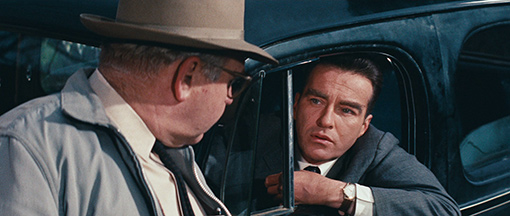
Played with just the right level of cautious self-assurance by Montgomery Clift, Glover is not someone I found myself initially warming to. He does, after all, arrive in this community as both an outsider and a representative of a federal agency, and he's cocksure enough to be convinced he can succeed where his predecessors failed, in spite of his youth. And he wears a suit. I've never trusted anyone who tries to convince you of anything while dressed in a suit. But we soon feel for Glover when he finds himself seriously out of his depth. His first approach to Ella sees the door shut in his face, and when he tries to convince Ella's adult sons that maybe their mother is going a bit senile and that it's thus their duty to make these decisions for her, one of them – who comes across as a not-too-distant cousin of Mongo from Blazing Saddles – picks Glover up, turns him upside-down and tosses him in the river.
As it turns out, the small island that Ella refuses to leave is not just a family home but a small community, a harmonious haven where the inequality that is part of everyday life just across the water has no place. Ella herself is a commanding force, one revered by those who live there but always with respect. And she's sharper than she looks. At one point she practically orders one of the island's many black residents Sam (played by Robert Earl Jones, the father of James) to sell her his dog in what appears to be a demonstration of her position of power, momentarily casting her as a former white plantation boss who is used to ordering her black workers around. But Ella is keenly aware even before she begins that there is no way on earth Sam would part with his animal. "I ain't gonna sell him, even to you," Sam tells her defiantly, "you ain't got no right to make me." "That's right," replies Ella with a barely perceptible wink, and turns back to Glover. "You see young man," she assures him, "Sam and me, we don't sell. Sam don't sell his dog and I don't sell my land that I've poured my heart's blood into."
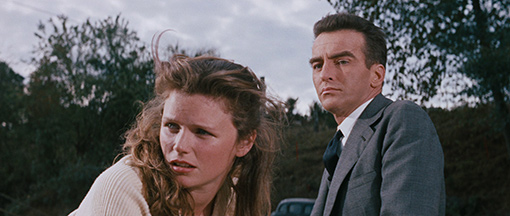
This intriguing set-up looks like taking a more traditionalist turn when Glover begins conversing with Ella's attractive but similarly determined daughter Carol (a strong early role for a red-hot Lee Remick). He likes her and she soon likes him, and you start to suspect that you could write the rest yourself. But little about how their relationship develops is by the standard Hollywood storytelling book. A widow and single mother of two, Carol is initially hostile to Glover's presence but is eventually drawn to him, not because he's good-looking Montgomery Clift, but because talking to him makes her realise how much she has missed good conversation. The pair approach the prospect of a relationship with cautious uncertainty, like two animals circling and sizing each other up before launching into passionate and potentially fulfilling battle, their conversations staged and lit in a manner that charges them with inexplicit eroticism. And then suddenly they are a couple, albeit one with an uncertain future, their relationship destined to last only as long as it takes Glover to convince Ella to leave her island home. But Ella has absolutely no intention of moving, and this puts Carol in a conflicting position, supportive of her mother but in love with the man whose job it is to clear the island before the flood waters arrive. Complicating things further is that Glover gradually finds himself warming to Ella's defiant stance and the small community that has grown up around her. He is, however, also keenly aware that a project of this scale and importance is not going to be held up by the refusal of a single individual to play ball. Knowing that she will ultimately be removed by force – something his PR conscious TVA superiors seem keen to avoid – he tries his best to persuade her to leave voluntarily, first by reasoning with her and then by undermining her island community by offering its black residents decently paid deforestation work on the mainland.
It's this racial aspect of the story that gives the film its socio-political bite. When a shortage of personnel on the clearing operation prompts Glover to suggest that they employ black workers, he is cheerfully informed that the local whites would down tools and walk if they were asked to work alongside them. Later, when a deal is struck to keep the work gangs racially segregated, Glover outrages local business owners by insisting they be paid the same rate as their white colleagues. To Glover, this not even an issue – that's just how it's done in a fair and equitable society, so why would he do otherwise? But his decision creates more trouble than he is physically or mentally equipped to deal with. In the film's scariest scene, this puts him, Carol and a man named Walter Clark – Carol's actual intended, who gets a bit of a bum deal here – at the mercy of a redneck mob (one of whom is played by a young Bruce Dern), who set about teaching this city boy a lesson whilst the local sheriff looks calmly on from the comfort of his vehicle. "They're just having some fun," he remarks to his deputy as the mob topple Glover's nice new car down the hill. Yet over the river on Ella's island, there is no such racial division or prejudice. Stubborn and a little domineering she may be, but she's still a damned sight more progressive than those who run the township and the businesses that sit just across the water.
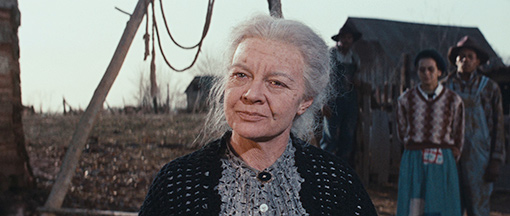
The performances, as we've come to expect from Kazan, are absolutely spot-on, with Clift and Remick at their finest here, sparking off each other in the early stage of their evolving relationship like smouldering embers in a tinderbox of desire. But dominating every scene she appears in is Jo Van Fleet's dynamite turn as the resolute Ella, an utterly convincing portrayal of forceful octogenarian grit and determination, made all the more astonishing by the knowledge that Fleet was just 45 years old when she played the role. Had I not been informed of that fact, I'd never have known, a testament both to Fleet's spot-on delivery and way with physical movement and Ben Nye's impressively naturalistic makeup.
The very nature of the story, grounded as it is in a real-world programme whose progress was not halted to accommodate the wishes of uncooperative individuals, we know that Ella will be forced to leave her island home one way or another, and when the moment comes Kazan makes sure we register what is being personally sacrificed for this socially progressive gain. It's a moving finale to a film that really does deserve the strong reputation and critical praise it has garnered over the years. Even today, Wild River remains an enthralling, surprising and oddly contradictory work, one that champions progressive attitudes whilst at the same time saluting the right of the individual to make a personal stand against the perceived greater good.
Oh, this is how Hollywood films from 1960 should look on Blu-ray. A terrific transfer that really does showcase Ellsworth Fredricks' gorgeous Cinemascope lighting and framing, notably his sometimes vibrant use of colour and the evocating light and shadow in the lamplit scenes between Glover and Carol. The contrast is attractively balanced throughout, the black levels unwaveringly solid, the detail crisp without any obvious trace of enhancement, and if there's a dust spot anywhere I must have missed it.
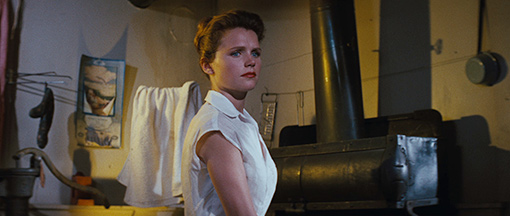
The Linear PCM mono 2.0 track has the expected range restrictions, but is otherwise in seriously good shape, with no trace of background hiss, damage or distortion. Kenyon Hopkins' music score is particularly well rendered.
Optional English SDH subtitles are included for the main feature.
Commentary
As Masters of Cinema expert commentaries go, this one by American critics Glenn Kenny and Farran Smith Nadine is a solid rather than essential listen. Neither Kenny nor Nadine have the sort of animated delivery and rampant enthusiasm that makes David Kalat's commentaries such a delight, and they do spend a little too much time pointing out what anyone watching the film should be easily able to see or deduce for themselves. Fortunately, they also provide plenty of useful background information on the production, the actors, the region in which it is set, and Kazan himself, whose work they are clearly devoted fans of.
Theatrical Trailer (3:00)
Pushing the film as a story of passionate love across the social divide, this is "Elia Kazan at his best!" That the director's name features so prominently in the trailer and not as "the director of [add past success here] tells a story in itself."
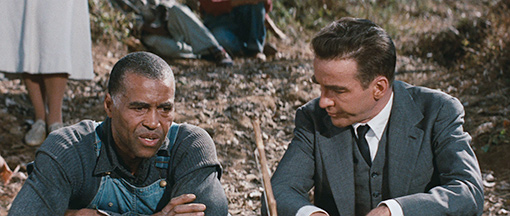
Stills Gallery
Though I'm not usually one for on-disc collections of still images, this one really is worth a look, containing as it does 63 high resolution behind-the-scenes photos and publicity stills, which are advanced manually using the chapter button on the player's remote control.
Booklet
You can usually get a vague idea of how many articles will be in a Masters of Cinema booklet by the size of the typeface, which here clues you in early on to the fact that there are only two. It matters not, as the main piece is a really well argued essay by Adrian Martin on Kazan and this film (that he quotes the same dialogue as I did above made me wish I'd read this before writing my review), which is followed by a short extract from a 1962 Films and Filming interview with Kazan in which he discusses the production. Credits, stills and notes on viewing are also included.
I guess I'll never be able to reconcile my issues with Elia Kazan, the man who named names for the career-wrecking House of Un-American Activities Committee, with my admiration for Elia Kazan, the hugely talented and influential filmmaker, and I'm not going to start dissing a film as good as Wild River simply because I don't agree with the politics of its director. Indeed, I was surprised how caught up in the story I quickly became, and the fact that we are able to simultaneously sympathise with Ella's standpoint and Glover's fish-out-of water predicament is to be applauded. A damned fine film, a gorgeous transfer and a couple of decent extras make it easy to recommend this disc.
* http://en.wikipedia.org/wiki/Tennessee_Valley_Authority
** http://www.tva.com/abouttva/history.htm
|